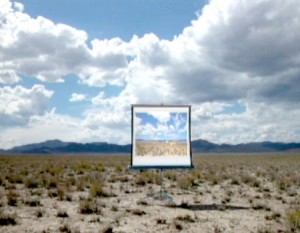 Multi-media artists eteam talk to us about being both removed and immersed in the creation of new work, about the non-existent singular and committing to an expansive sense of “we.”
Multi-media artists eteam talk to us about being both removed and immersed in the creation of new work, about the non-existent singular and committing to an expansive sense of “we.”
Collaboration goes deep for eteam. Not only do you generate projects through your partnership and work with other artists, but you enlist lay people– farmers, barbers, small town residents– to either execute or substantiate the project. When you collaborate, how do you relate to the idea of control? Is it difficult to cede control? How do you satisfy your need for an imaginatively and intellectually rigorous project while leaving it open enough to be determined by unvetted participants? When we work together with other people, especially people whom we have never met before, we control the situation by paying attention or not, shape things rather non-verbally by pointing a recording device towards a situation or not. That’s all. The recording device approves and it energizes. Where nothing has been happening before something is happening as soon as we press the ON button. ON means attention and it implies control, because the situation is automatically framed. Either something fits into the frame or not. Everything outside the frame is irrelevant.
If we approach a new situation we usually start with close-ups. We spend most of our time in close proximity to the details, to the objects that characterize circumstances, the spoken words that define a situation, the actions of the individual. The more comfortable we get, the further we can step back and widen the angle. We include more of what is happening from a distance and remove ourselves further and further to simultaneously provide an overview and loose control. Control might be a spatial thing. We always want to be removed and immersed. Very close and very far away, distanced enough to realize how small and fragile every human construct is in comparison to the rest of the universe, but at the same time close enough to appreciate even the smallest effort to keep the human construct alive.
Much of your work puts the virtual and the terrestrial or human in the same frame; for example, buying an allotment garden on ebay, or creating a scenario by which a human walking between two computers and transferring data eventually works faster physically than the computers do virtually. What makes a space a place? When does a terrestrial place stubbornly refuse to become an imaginative or virtual one? And vice versa? It’s interesting to imagine how “a place stubbornly refuses to turn virtual” and why the properties of a place would not lend themselves to be easily transformed into another medium. It’s a funny thought. It sounds as if you walk over a meadow and say: “Fly!” and the meadow says: “I am not a cloud, I am a meadow”, and one replies: “Then why do you act like a stubborn ox, and not like a meadow?” What chance does the meadow have after all? How does a place prevent being talked to, thought about, dreamt about,being reached through speculations, captured through calculations? The meadow can’t turn around and walk away. The meadow can turn into a desert, but that doesn’t change the fact something is still there. The only advantage a place has over humans is that a place has much more time.
Humans haven’t had enough time yet to think about everything.
Most of the physical places around us purely exist. We have no attachment, even if we place our body within the coordinates. These places might have been thought about in the past, but in their current state they are barely looked at – and therefore hardly accessible. As long as the body can function properly, it does not matter where the body is situated. The moment a body-part engages space turns into a place.
How do you work as a “we”? How do you answer questions as a “we”? You’ve been writing short books– book-length essays or novellas; how do you write as a unit? Are there meaningful limitations to “we” in terms of the art you’d like to create in the future? “We” is in fashion right now. 99% of us is “we” and even the singled out white alpha males of the remaining 1% say: “We are pregnant, we gave birth, we are breastfeeding.” It’s all a matter of how one defines pregnancy. It’s the same with writing or ideas. Who has ever come up with an idea all by himself?
To us “we” is exciting because we know it’s temporary. “We” is a luxury because “I” will die alone. But besides, does it really make sense right now to say “I” wrote the novella,” when every sentence in this accumulation of words has been pollinated by the Internet, when every word has been googled, when every thought is second-hand and machine-driven? You ask about meaningful “limitations” in the use of “we” and the only limitation that comes to mind is to resist the “definition” of “we.” After we all have become facebook friends, why bother? A “like” is a “like.” “We” vote for each other to exist. “We” count in apathetic “likes” and judge by the numbers. There is a “we-ness” all around us, so why use “I” to record that moment in time – when “i” has been turned into a lower case character – a product, a machine, a machinery that generates exclusive individuals like one-dollar bills?
